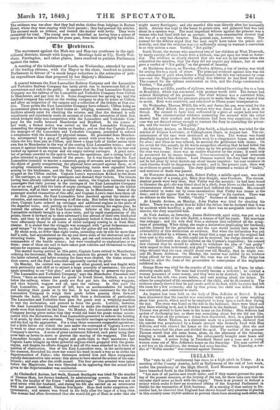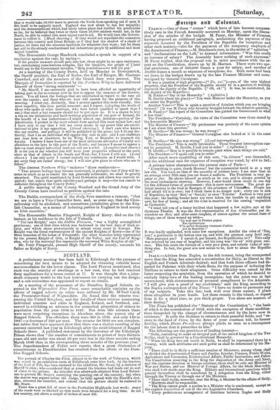IRELAND.
The "rate in aid" excitement has risen to a high pitch in Ulster. At a meeting of the County Antrim, held at Ballymena at the end of last week, under the presidency of the High Sheriff, Lord Massareene is reported to have launched forth in the following strain- " Let men of all parties and creeds unite; and if they cannot prevent the pass- ing of the present measure, or the levying of the tax, let them take care that the intruder shall never go back with the supply." There is at present in Ireland a society which seeks to have an occasional sitting of the Imperial Parliament in Dublin for the transaction of Irish business. At a meeting of that society in Dc- comber last, he observed that England had shown herself very generous in placing in this country some 50,000 soldiers to prevent them from shooting each other, but
that it would take 50,000 more to prevent the North from speaking out if once it felt itself to be unjustly taxed. England was now about to tax her unjustly; and the demonstrations which had lately taken place had verified his predictions so far, for he believed that twice or three times 50,000 soldiers would not, in the North, be able to collect this most unjust rate in aid. He would dare the Govern- ment to collect it. (Much cheering.) If they would not repudiate the connexion between this country and Great Britain, or if they had the shadow of a shade of justice, let them tax the absentee landlords for whatever they want ; but let them not add to the already overburdened but industrious people by additional and most unjust taxation. The Honourable George Handcock concluded a speech in support of a resolution against the rate, by saying—
If the present measure should pass into law, there might be no open resistance, but, entertaining conscientious scruples, like the Quakers, the people of Ulster would say to the Government invaders, "Help yourselves—we will not pay."
At a meeting of the County Down, held on Monday in Downpatrick, the Sheriff presided; the Earl of Roden, the Earl of Bangor, Mr. Sharman Crawford, and all the members of the Grand Jury were present. The Marquis of Downshire is reported by the Northern Whig to have delivered himself of these" strong sentiments "— " Mr. Sheriff, I am extremely glad to have been afforded an opportunity of taking part in the movement now on foot to oppose the measure of the Govern- ment. You all know the feelings that are entertained in regard to the rate all over the county; and those who are here will answer for the purposes of this meeting. I mast say, distinctly, that I protest against this most rascally, this most impolitic, this most partial measure; and I repeat, (adopting the words of those who spoke at other meetings, who were better qualified to speak than I am,) that such a bad measure should not be put upon us. It is a shame to levy a tax on the industrious and hard-working population of one Fart of Ireland, for the benefit of a less industrious—I might almost say, indolent—portion of the inhabitants. I protest in the most solemn form against this most unjust law; and I have only to say that I will use every means in my power that are consti- tutional to give it my opposition. (Great cheering.) I don't care who knows this my resolve, and perhaps it will be published by the press; but I do say dis- tinctly, that I as an individual will oppose this rate in aid: and I can challenge any man here or elsewhere, be he Whig, Tory, or Repealer, to impeach my loyalty. I believe I have been one of the most strenuous advocates of loyalty and obedience to the laws in this part of the North; and because I mean to oppose a law—a most stupid law—they need not call me a rebel. (Laughter and cheers.) It is for you to say whether you will have your properties reduced to the same state as that of others in the South and West; but I know I will not. (Loud cheers.) I am only sorry I cannot embody my sentiments as I would wish. I am sorry they are rather strong; but I will now give place to others who are to follow."
The discreet Northern Whig " endorses" these sentiments-
" That present feelings may become moderated, is probable; but if they will be- come so much so as to render the tax generally collectable, we shall be greatly surprised. The spirit manifested by Lord Downshire and others was scarcely re- quired; but, unless that spirit subside—and perhaps it may—the tax cannot be collected throughout the County Down."
A public meeting of the County Wexford and the Grand Jury of the County Cavan have resolved to petition against the rate.
The Dublin correspondent of the Daily News mentions a rumour, "that we are to have a Vice-Chancellor here, and, as some say, that the Chan- cellorship will be abolished, and concurrent jurisdiction given to the Eng- lish Chancellor, as a means of inducing parties in England to lend money on Irish securities."
The Honourable Maurice Fitzgerald, Knight of Kerry, died on the 7th instant, at his residence in the Isle of Valentia.
"The late Knight," says the Dublin Freeman, "was a highly accomplished gentleman; one of that class which was fashioned in the hest days of Irish so- ciety, and which shone preeminently in almost every court in Europe. The Knight was the lineal representative of the ancient Knights of Kerry—one of the three branches of the house of Fitzgerald; the other branches being represented by the present Knight of Glin, or Knight of the Valley, and the Earl of King- ston, who by the maternal line represents the renowned White Knights of old."
Mr. Peter Fitzgerald, present High Sheriff of the county, succeeds his father as Knight of Kerry.



























 Previous page
Previous page